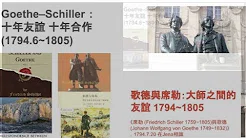今天是Herbert Alexander Simon (June 15, 1916 – February 9, 2001)先生"生日"。
我跟東海的羅時瑋教授"打氣",出版一本退休的文選作紀念。
我說個故事:Complex Information Processing The Impact of Herbert A. Simon (1989) 這本書是Herbert A. Simon 70大壽的慶祝論文集。Simon 自己寫的"科學家做為問題解決者"一文,收入其回憶錄Models of My Life的末章(1996)。" 又,Complex Information Processing"是CMU稱"人工智能" (AI 的用法。
我原計畫作5片,結果只作出3片*--待後製
*《席勒 (Friedrich Schiller 1759~1805)與歌德 (Johann Wolfgang von Goethe 1749~1832)》,
*IV. Gustave Flaubert, 1821~80 and George Sand 1804~76
227 《喬治‧ 桑與福樓拜 》 2018-0509 漢清講堂
*V.川端康成 與 東山魁夷
2018年為紀念Herbert A. Simon的系列演講『益友系列: 友情六講 (及主要文獻根據 ) 2018年6月15日 』主題之一,預計5月9日在漢清講堂錄影。
II.《席勒 (Friedrich Schiller 1759~1805)與歌德 (Johann Wolfgang von Goethe 1749~1832)》,
IV. Gustave Flaubert, 1821~80 and George Sand 1804~76
V.川端康成 與 東山魁夷
I. Herbert A. Simon 1916~2001and Allen Newell 1927~1992
III. Amos Tversky and Daniel Kahneman
VI. 馬克斯與恩格斯 (2018年暫時跳過)
VII. W. Edwards Deming and W. A. Shewhart
2016年6月15日 3:37 ·
這篇寫得很不錯。記住,20世紀末, Herbert Simon的辦公室內,即有繪畫和音樂的人工智能軟體。現在.....
文中說他寫的書達20本,最有名的是{管理行為} (拙譯蒙 Herbert Simon列入書單。)
我也可以講講他與Jorge Luis Borges 的訪談、互動:
“A book is not an isolated being: it is a relationship, an axis of innumerable relationships”
―from FICCIONES by Jorge Luis Borges
不知何故,The Economist 的 Herbert Simon 網路訃聞 2001.2.22,竟然少了第一段:
Complex Information Processing The Impact of Herbert A. Simon (1989) 這本書是Herbert A. Simon 70大壽的慶祝論文集。Simon 自己寫的"科學家做為問題解決者"一文,收入其回憶錄Models of My Life的末章(1996)。" 又,Complex Information Processing"是CMU稱"AI 人工智能"的用法。
https://saltworks.stanford.edu/catalog/druid:tx160kr1926
Author:
Edward FeigenbaumAccess:
PublicSeries:
Accession 2005-101Subseries:
EAF - What Hath Simon Wrought1987Box:
Box : 34Folder:
13ID:
druid:tx160kr1926Tagged By Donor:
AI, History, SimonDonor Notes:
Chapter in Book (1989); Feigenbaum, E. 1989. What Hath Simon Wrought? In D. Klahr & K. Kotovsky eds. Complex Information Processing The Impact of Herbert A. Simon. Hillsdale, New Jersey, Lawrence Erlbaum Associates Publishers.
我曾讀過亞里斯多德的友誼論的中文介紹,現在一時沒找到。
漢清講堂在2018年3至6月,曾計畫談7個個案,後來只完成三個:

55:21
234 大師之間的友誼﹕歌德與席勒(1794-1805) 2018-06-10

24:41230 川端康成と東山魁夷 2018-05-04

38:52227 《喬治‧ 桑與福樓拜 》 2018-0509 漢清講堂
32 views2 months ago
六月十五日,Herbert A. Simon 紀念日,主題:友情
Barack Obama hired Cass Sunstein, a scholar heavily influenced by them, to design behavioural “nudges” that encourage people to do the right thing without forcing them

ECONOMIST.COM
Tversky and Kahneman's work on irrational decision-making is still changing the world
From the archive
The Undoing Project: A Friendship That Changed Our Minds Hardcover– December 6, 2016
by Michael Lewis (Author)
Forty years ago, Israeli psychologists Daniel Kahneman and Amos Tversky wrote a series of breathtakingly original studies undoing our assumptions about the decision-making process. Their papers showed the ways in which the human mind erred, systematically, when forced to make judgments in uncertain situations. Their work created the field of behavioral economics, revolutionized Big Data studies, advanced evidence-based medicine, led to a new approach to government regulation, and made much of Michael Lewis’s own work possible. Kahneman and Tversky are more responsible than anybody for the powerful trend to mistrust human intuition and defer to algorithms.
The Undoing Project is about a compelling collaboration between two men who have the dimensions of great literary figures. They became heroes in the university and on the battlefield―both had important careers in the Israeli military―and their research was deeply linked to their extraordinary life experiences. Amos Tversky was a brilliant, self-confident warrior and extrovert, the center of rapt attention in any room; Kahneman, a fugitive from the Nazis in his childhood, was an introvert whose questing self-doubt was the seedbed of his ideas. They became one of the greatest partnerships in the history of science, working together so closely that they couldn’t remember whose brain originated which ideas, or who should claim credit. They flipped a coin to decide the lead authorship on the first paper they wrote, and simply alternated thereafter.
This story about the workings of the human mind is explored through the personalities of two fascinating individuals so fundamentally different from each other that they seem unlikely friends or colleagues. In the process they may well have changed, for good, mankind’s view of its own mind.

沒有留言:
張貼留言